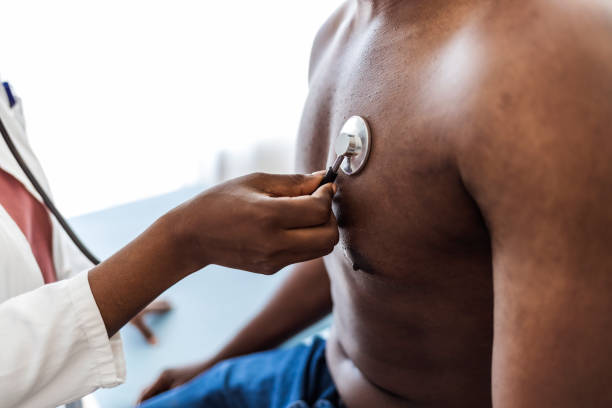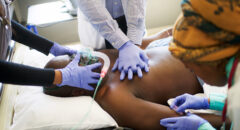
If it appears abruptly, don’t dismiss it. Chest discomfort is a common indicator of heart disease, but it’s not the only one. Shortness of breath—which might seem like you’re pushing yourself more than usual—can indicate heart valve problems, heart attack, heart failure, and other cardiovascular disorders.
Dyspnea—shortness of breath—has several definitions: You may experience suffocation, “air hunger,” or strong chest constriction.
What Types Of Heart Problems Cause Shortness Of Breath?

Heart Valve Disease
Four valves of the heart direct blood flow throughout the body. According to the US National Library of Medicine, blood flow may be affected by faulty valves.
Heart valve abnormalities usually occur in two ways: Hal Skopicki, MD, Ph.D., head of cardiology and co-director of the Stony Brook Heart Institute in New York, tells SELF that one or more valves stiffen and fail to open or seal. Blood may pool against the lungs and cause shortness of breath when valves malfunction. This strains the heart and may lead to heart failure, in which the heart cannot pump enough blood to essential organs.
RELATED: Keep Your Heart Healthy At Any Age
Heart Muscle Problems
Dr. Skopicki notes that when the heart muscle has trouble ejecting blood forward, it may induce shortness of breath. Cardiomyopathy, which thickens, weakens, or stiffens the heart muscle, may impair blood pumping. According to the Centers for Disease Control and Prevention, heart disease, endocrine illnesses, alcoholism, viral infections, and some chemotherapy and radiation may cause heart muscle difficulties (CDC).
Some healthy pregnant women develop cardiomyopathy. Stacy Rosen, MD, cardiologist and vice president of women’s health at North Shore-LIJ Health System’s Katz Institute for Women’s Health, tells SELF, “It’s critical to not simply think that breathlessness is typical during pregnancy.” Dr. Rosen believes pregnancy might reveal preexisting cardiac abnormalities.
Issues With The Heart’s Electrical System
Electrical signals govern heartbeats. According to the Mayo Clinic, these signals may malfunction and cause the heart to beat erratically (arrhythmia), rapidly (tachycardia), or slowly (bradycardia) without warning. An irregular heartbeat might be unnoticed. Dr. Skopicki says it sometimes causes shortness of breath.
RELATED: 9 Types of Treatment for Coronary Artery Disease
Blockages In The Arteries
Coronary artery disease, also known as coronary heart disease or ischemia disease, occurs when the main blood channels that provide oxygen-rich blood to your body cannot supply enough blood, oxygen, and nutrients to your heart. The CDC says it’s America’s most prevalent cardiac disease.

When Does Shortness Of Breath Signal A Potential Heart Problem?
Shortness of breath from cardiovascular disorders may occur abruptly or gradually. Some signs might indicate cardiac trouble:
1. You’ve Noticed Other Potentially Concerning Symptoms
How’s your body? If you have a cardiac rhythm disorder, you may have heart palpitations, anxiety, lightheadedness, chest discomfort, and excessive weariness. Dr. Rosen states, “Shortness of breath from heart failure will frequently be detected with leg edema or dyspnea when you lay down at night.” He says that artery problems might cause dyspnea, chest discomfort, and heaviness.
Dr. Skopicki recommends seeing a doctor immediately if you have chest discomfort, tightness, or pressure with shortness of breath. If you’re short of breath or have stiffness, numbness, or weakness in your arms, legs, jaw, neck, or throat, these are warning signs. You may not notice any symptoms, and women tend to have unconventional heart-related symptoms.
RELATED: Can You Tell If Your Own Heart Is Failing?
2. You’re Not Exerting Yourself When Shortness Of Breath Hits
Track your shortness of breath. Is it during a hard exercise or when you’re visibly working harder than usual? Does it happen while you’re not even trying? Dr. Rosen says certain cardiac issues might make you feel breathless at night and while walking or climbing stairs.
Shortness of breath that occurs abruptly, while you’re not exerting yourself, or when you typically wouldn’t be winded may indicate a heart problem.
RELATED: What Black People Should Know About Heart Disease Risk
3. You Already Have An Elevated Risk Of Heart Disease
Dr. Skopicki advises considering cardiovascular risk factors while assessing shortness of breath. These include pregnancy, smoking, hypertension, diabetes, high cholesterol, renal illness, and a history of heart attack or other cardiac disorders (including being born with a heart condition).
The CDC says food and exercise may also have an impact, but these aspects are multifaceted and need careful evaluation of a person’s circumstances. Weight and BMI don’t always indicate cardiac health either.
Other health conditions cause shortness of breath (dyspnea)
- Lung and airway conditions
- Asthma.
- Allergies.
- Chronic obstructive pulmonary disease (COPD).
- Respiratory illness (like bronchitis, COVID-19, the flu or other viral or bacterial infections).
- Pneumonia.
- Inflammation (pleurisy) or fluid (pleural effusion) around your lungs.
- Fluid (pulmonary edema) or scarring (fibrosis) inside your lungs.
- Lung cancer or pleural mesothelioma.
- High blood pressure in your lungs (pulmonary hypertension).
- Sarcoidosis.
- Tuberculosis.
- Partial or complete collapsed lung (pneumothorax or atelectasis).
- Blood clot (pulmonary embolism).
When Should You See A Doctor?
Visit the emergency room if your symptoms appear suddenly and interfere with daily life. Dr. Rosen believes a strong allergic response or lung blood clot might cause abrupt shortness of breath.
Remember that many heart issues develop slowly, so don’t ignore mild symptoms. Dr. Rosen believes most people underestimate symptoms. “If anything doesn’t feel right, have it looked out?”
Depending on the urgency, this could mean visiting an ER, urgent care center, or primary care doctor for a checkup. If you have unexplained shortness of breath or a voice telling you something is wrong, visit a doctor. “You’re never too young or too elderly to worry about heart disease if you’re feeling shortness of breath,” says Dr. Rosen.









